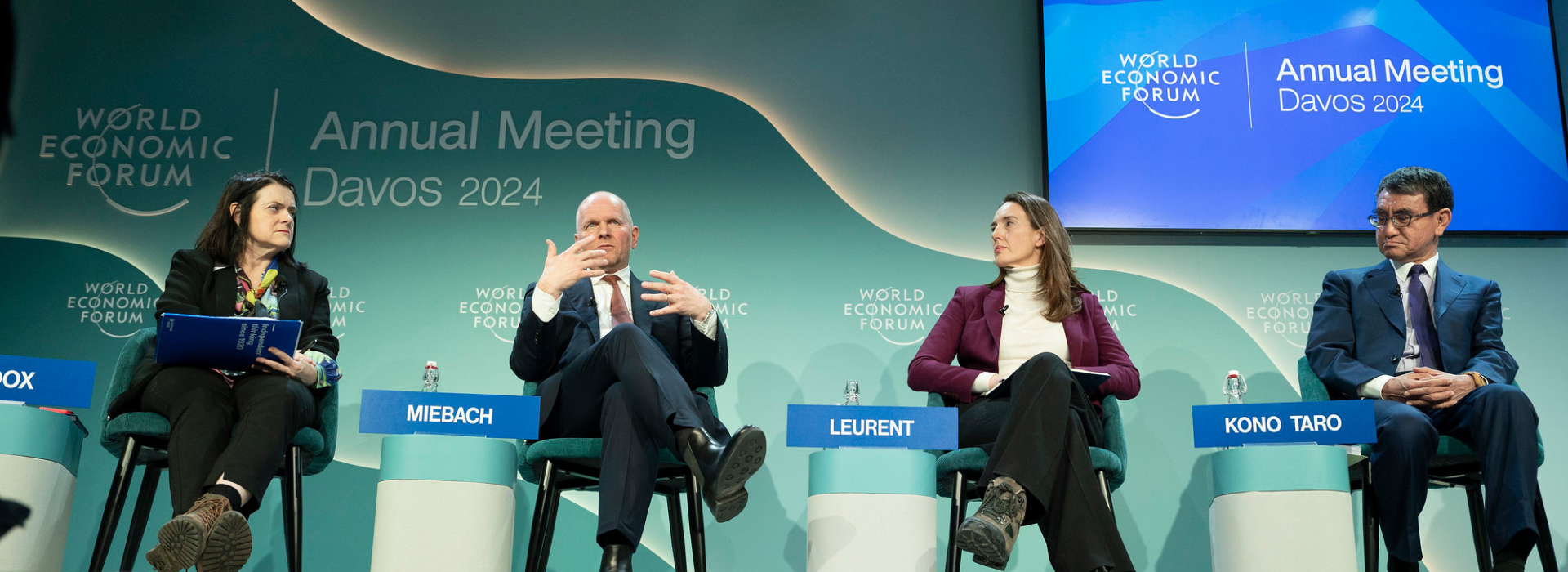Davos takeaways: Collaboration and transparency to guide AI, propel sustainability and trust
January 22, 2024 | By Deborah Lynn Blumberg
With today’s headlines a stew of geopolitical conflicts, cooling economies and tension over AI, setting global priorities for the coming year is a tall order. But that’s what more than 2,800 of the world’s most influential people — policymakers, finance and tech executives, academics, celebrities, activists and journalists — set out to do in the snowy Swiss Alps for the World Economic Forum’s annual summit in Davos.
The conference’s theme of “Rebuilding Trust” reverberated throughout discussions on topics ranging from the tech revolution to the future of work. Experts pointed to ways we can collaborate to address some of today’s thorniest challenges.
Here are four takeaways from Davos 2024:
01
AI and other digital tools can spur inclusion
From billboards and store takeovers across town to panel discussions and hallway conversations, artificial intelligence (unsurprisingly) stole the show. As AI advances at lightning speed, world leaders and top executives pointed out ways technology could help those who are underbanked or lack access to credit.
For example, Mastercard Chief Digital Officer Jorn Lambert laid out how bringing people into the digital economy with digital tools can fuel economic growth during a TIME100 Talks roundtable discussion. “If a person is stuck in a cash economy, they cannot have a record of their financial transactions, they cannot build a credit history, they cannot climb the economic ladder,” he said.
“The digital economy in itself is the best answer to building transparency,” Mastercard CEO Michael Miebach said at a separate panel on how businesses can use transparency to strengthen trust. “A data trail can help with transparency, a cash trail cannot.”
Yet many also warned of risks and unintended consequences, such as AI-powered misinformation and disinformation and how to maintain consumer privacy.
“We need to have a conversation on the proper governance of AI, how we make sure we use the benefits of the technology but do it in a way that’s human-centric and that lives up to our values,” Tim Murphy, Mastercard’s chief administrative officer, told the Financial Times.
And without inclusive access to AI, we risk widening existing digital divides or creating new ones, according to the World Economic Forum's AI Governance Alliance, which released recommendations at Davos for advancing AI safely and responsibly.
To help combat the ill effects of AI, the European Union has created the world’s first broad set of AI rules. European Commission President Ursula von der Leyen said at one panel, “Our future competitiveness depends on AI adoption in our daily business. And Europe must up its game and show the way to responsible use of AI.”
“We have to take the unintended consequences of any new technology along with all the benefits, and think about them simultaneously,” said Microsoft CEO Satya Nadella at another panel, “as opposed to waiting for the unintended consequences to show up and then address them.”
02
Safety and security are crucial as fraudsters and hackers become more sophisticated
Davos attendees weighed the delicate balance between innovation and safeguarding consumers’ privacy and security. “Fraud is an emerging issue and often targets the most vulnerable populations,” Ling Hai, president of Asia Pacific, Europe, Middle East & Africa for Mastercard, said in an interview with MoneyControl. “This is where banks and the global networks like us step in and use technology to help protect our consumers.”

Mastercard Chief Digital Officer Jorn Lambert, second from right, at a panel on harnessing new technologies to propel financial inclusion at Davos 2024. (Photo credit: Biz Cozine)
Key is to “evolve in a safe way,” Lambert said during the Financial Times’ “The Davos Daily Show.” “Given that technology is moving so fast, and inevitably impacts the regulation that comes later, we need to understand how to self-regulate in the meantime.”
AI will also be essential in fighting fraudsters. “Cybersecurity is a good use case in AI, and you will continue to see that evolution,” Ling Hai said. Mastercard, for its part, has spent $7 billion in the last five years to strengthen its cybersecurity systems.
“We need to change the mindset that cybersecurity, rather than to be a cost or expense, is an investment,” said Belasario Contreras, the senior director for global security and tech strategy at Venable, told the Financial Times.
03
To combat climate change and equity challenges, partnerships are more important than ever.
Climate change poses an existential crisis, yet geopolitical and other divides have kept key players from coming together to develop global solutions. Leaders can change that dynamic by creating new climate, financial inclusion and tech partnerships.
“Partnership and collaboration are key to success,” said Linda Kirkpatrick, president of the Americas at Mastercard. “While we all come from different walks of life, different segments, different parts of business, commerce, government, the private and public sector, we share common goals, and finding those commonalities and figuring out where we can cross-collaborate is the most exciting opportunity.”
One area that’s ripe for partnership is digital public infrastructure, in which governments build and operate frameworks that manage digital identity, payments or other digital services. The goal is to drive societal and economic progress worldwide, like bringing access to the unbanked, and to narrow the digital divide.
This can be accomplished faster and more securely with private sector investment, said Ling Hai at another panel.
Governments and private enterprises together have made great strides in catalyzing digital development to improve access to the digital economy, enabling inclusion and economic growth, he added. “An average user is looking for convenience and security — this is where private sector ingenuity can really come into play.”
04
There's room for economic optimism
Wars in both Europe and the Middle East coupled with upcoming elections in eight of the world’s most populous countries are casting uncertainty over global economic activity.
Still, there are bright spots. Growth has been better than expected and inflation has ebbed. Job prospects and spending have improved, too. “The outlook on the labor market remains positive for the time being, which will help consumer spending,” Miebach said in an interview with Bloomberg Daybreak Europe.
For 2024, the Mastercard Economic Institute anticipates a year of global expansion after consumer spending was resilient in 2023. In the U.S., consumers have mostly adjusted to higher interest rates, Miebach said. Still, he expects they will continue to spend carefully this year, prioritizing purchases with borrowing costs remaining high.
Banner photo: Miebach, second from left, with Bronwen Maddox, left, director and chief executive, Chatham House; Helena Leurent, third from left, director-general, Consumers International, Switzerland; and Kono Taro, Japan's minister for digital transformation of Japan, right, at the session "Building Trust Through Transparency" at Davos 2024. (Photo credit: Pascal Bitz/World Economic Forum)
This month, the Mastercard Newsroom is exploring how rapidly evolving technology, heightened consumer expectations and economic and societal pressures are changing how we live, work, shop and innovate.


“As more people become digital, they gain access to the formal economy, and that will help them ensure that they move from access to usage to financial security and health. That’s really built on the foundation of trust. The only thing that engenders trust in a system or in the government is frequency of usage and making sure the thing you do over and over again works every time.”
Shamina Singh, founder and president, Mastercard Center for Inclusive Growth, on the importance of trust in advancing the digital economy.
“We focus on the manifestations and aspirations of consumers and customers. With new technologies and the democratization of product development, true differentiation comes from marketing – from creativity and innovation.”
Mastercard Chief Marketing and Communications Officer Raja Rajamannar, on the implications AI has for brands and brand storytelling.
"We are a payments network, so our reach is quite substantial. We are in a unique position to provide opportunities for action. We have a sustainable consumption strategy at the core of what we can offer in terms of climate solutions, helping to transition consumption to be more sustainable. The strategy is to inspire people to want to choose a more sustainable produce or service, inform them of the right data at the right moment in the purchasing process, and engage by providing opportunities for action."
Mastercard Chief Sustainability Officer Ellen Jackowski, on helping people harness their own spending data to encourage sustainable consumption.
“I’m hearing three themes — inclusion, sustainability and, of course, no surprise, AI. What’s been really interesting is the human element and the connection between the three: How can we make these things human-centric and how can we use AI to increase sustainability and inclusion.”
Salah Goss, head of North America, Mastercard Center for Inclusive Growth, on training technology on societal and environmental challenges.
-
2024
- Davos takeaways: Collaboration and transparency to guide AI, advance sustainability and propel trust